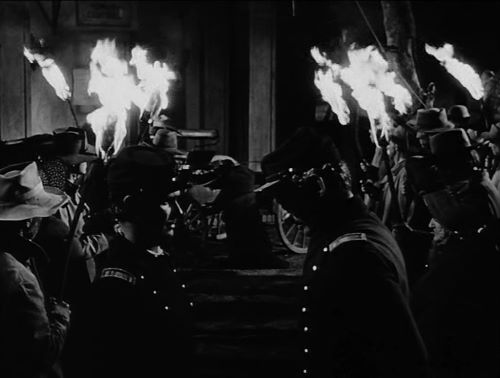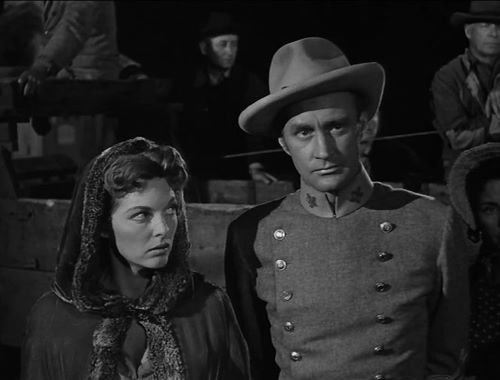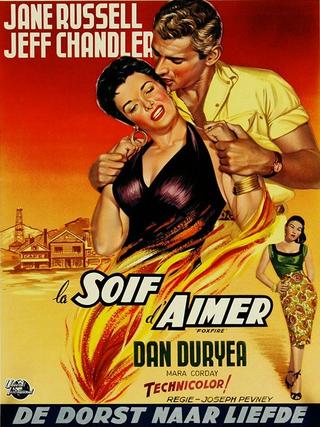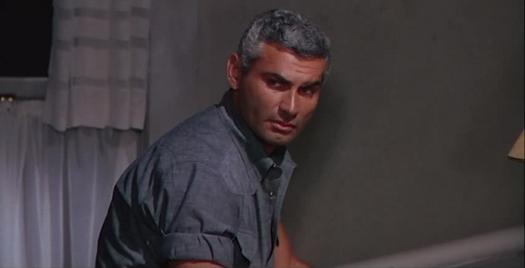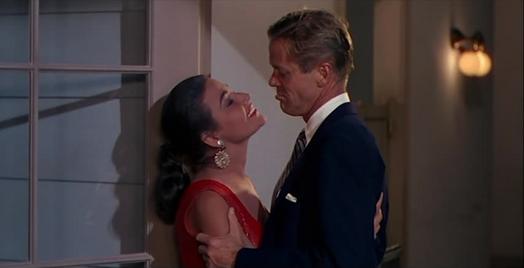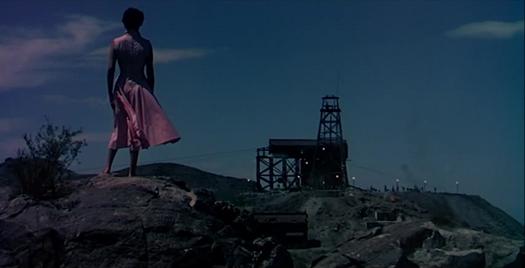Drango (1957) is a somewhat obscure western that makes for interesting viewing. Taken as a document of the Reconstruction era in the wake of the Civil War, it doesn’t really succeed or at least it’s not especially convincing. On the other hand, it is very effective indeed as an examination of redemption, and in this case atonement. It’s far from the first time I’ve featured a movie driven by that theme as the classic western era is awash with examples. The fact that the film largely succeeds in spite of some of its weaknesses is due in no small part to the work of its star Jeff Chandler.
One can practically taste the hostility at the beginning of the film. The implacably surly expressions of the inhabitants of the small town in Georgia which greet the new military governor give a strong indication of what lies ahead. It’s the post-Civil War period and the old wounds are still raw, old resentments still nurtured. The new governor is Major Drango (Jeff Chandler) and there is a brief, blink and you miss it reference to his past before more immediate concerns take over. Drango’s mission is to get things back to normal as soon as possible, which naturally involves seeing that law and order is restored. This kind of task requires considerable bridge building skills, something Drango sets about practicing as soon as possible. However, he is presented with an obstacle, a settler (Morris Ankrum) on an outlying farm turns up in his rooms hoping to persuade the Major to transport him to the nearest garrison for trial. This man was unsympathetic to the Confederacy and a raid on his property by returning veterans saw a man killed. Not unnaturally, he is dubious about receiving a fair trial in his home town. The rancor of his fellow citizens is tangible during his arraignment and his fears are to be proved correct when he’s subsequently abducted from the jail and lynched in the town square. It’s here that Drango’s guilt is first apparent, not least when faced with the scorn of the dead man’s daughter (Joanne Dru), and as the story progresses it becomes increasingly obvious that this is something he wears like a second skin. What is also clear is the fact that this guilt is rooted in something deeper, although exactly what is only revealed late in the day. In the meantime, he sets about winning hearts and minds, a goal made even more difficult by the subversive plotting of one of the town’s faded gentry (Ronald Howard), a man hell bent on fanning the flames of conflict once more.
Drango was made by Jeff Chandler’s production company Earlmar and he got hold of some fine talent to work on it. Elmer Bernstein wrote the score and those characteristic riffs and hooks he frequently employed can be heard throughout. The cinematography comes courtesy of James Wong Howe and his lighting of interiors and the nighttime scenes is as exemplary as one might expect. Hall Bartlett and Jules Bricken co-direct in a fairly matter-of-fact fashion but the pacing is good. Yet, as I mentioned at the top of this piece, there are weaknesses. If a film wants to be regarded as a serious consideration of the mood and effects of the Reconstruction era, then it’s not unreasonable to expect some reference to slavery. After all, this is set in a town in Georgia and a few of the characters live in the type of mansions to be found on plantations yet there is no mention whatsoever made of this. What’s more, the entire cast contains not one black face, which again strikes me as very odd indeed given the time and location depicted. The result is that there is a degree of artificiality to this image of a post-Civil War town and consequently the whole north-south friction aspect feels a bit fake. The film in essence starts to feel somewhat generic in its portrayal of post-conflict tensions. However, this is basically background material and what rescues the movie is the strong focus on atonement and redemption.
Jeff Chandler was an authoritative presence, a quality which grew as the years passed. He had what is commonly termed gravitas but that alone can make for dull viewing. Chandler’s great strength lay in his ability to convey a certain frailty behind the authority. He has a number of scenes where he gets to boss the situation, glaring down a horde of hungry and desperate townsmen as well as punching out a belligerent, bottle-wielding foe. He also makes a few speeches, which are heartfelt and impassioned but his best moments come in the smaller, quieter passages. The sensitivity of the man is clearly discernible when he has to extract a bullet from a patient who is still conscious, the concentration and reflected pain writ large on his features. Then there’s the potency of a simple and wordless scene where he leaves a few humble presents for a family of orphans on Christmas Day, and of course his carefully controlled outrage as he carries the remains of a youngster who has perished in a deliberate arson attack. All of this is buttressed by the corrosive guilt the man is carrying within – it’s only really when his true past is hauled out in the open that the reasoning which underpins his compassion makes sense.
Joanne Dru exudes stoicism as the woman who has lost her father, lost everything in life if truth be told. Her slow drift from bitterness to acceptance and finally love is achieved naturally and organically. Ronald Howard, in his first Hollywood film, provides an object lesson in pride and ruthlessness as the Canute-like figure who yearns for even more bloodshed. Julie London (Saddle the Wind, The Wonderful Country, Man of the West) was always an attractive addition to any cast and while her part here is less developed and less interesting than that of Joanne Dru, she brings an air of class to proceedings whenever she appears. There’s good support from Donald Crisp, Walter Sande, John Lupton, Milburn Stone and the curmudgeonly Chubby Johnson.
Drango is a hard-edged and at times quite dark redemptive western. Maybe it does not do or get everything right, but it’s a movie with its heart in the right place all the same. This is bolstered by a characteristically compassionate performance from Jeff Chandler, an actor who rarely if ever disappoints. As far as availability is concerned, there are DVDs from France and Italy, the latter looking crisp and clean though almost certainly presented open-matte. All told, this is a satisfying western that is well worth a look.

